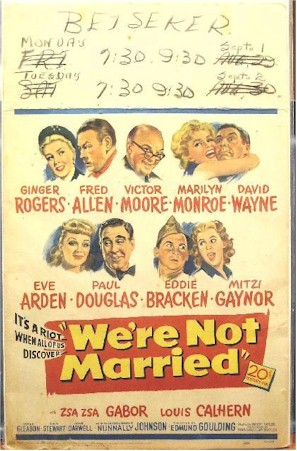
WE'RE NOT MARRIED
US, 1952, 86 minutes, Black and white.
Ginger Rogers, Fred Allen, Victor Moore, Marilyn Monroe, David Wayne, Eve Arden, Paul Douglas, Eddie Bracken, Mitzi Gaynor, Louis Calhern, Zsa Zsa Gabor, James Gleason, Paul Stewart, Jane Darwell.
Directed by Edmund Goulding.
This would have been what was called in those days a saucy title for a comedy. The gist of the film is that a Justice of the Peace, Victor Moore, has to let five couples know that there has been a flaw in the marriage contract and that they are not legally married. The couples are Ginger Rogers and Fred Allen, Marilyn Monroe and David Wayne, Eve Arden and Paul Douglas, Eddie Bracken and Mitzi Gaynor, Zsa Zsa Gabor and Louis Calhern. They each have their own problems – some pleasant, some wishing for a divorce and alimony (Calhern and Gabor), others bickering.
The film has a very strong cast – and Marilyn Monroe was also to appear in one of the stories in the portmanteau film Full House. The film was released before she made Gentlemen Prefer Blondes and Niagara.
The film was directed by Edmund Goulding who had made a number of classic films in the 1930s and early 40s including the Oscar-winning Grand Hotel. He made a number of Bette Davis films including Dark Victory, The Old Maid and The Great Lie. In 1946 he made The Razor’s Edge and Of Human Bondage. His films after Nightmare Alley in 1947 tended to be light comedies like this one.
1. How enjoyable a comedy? What were the best comedy ingredients and how used?
2. This comedy as typical of the early fifties, the black and white style, the use of stars, the social. emphasis in the comedy, the American overtones? How successful in these aspects?
3. Comment on the film's brevity, the compact presentation of the sequences and the issues, the total impact.
4. The value of the structure: the initial marriage, the question of validity, time passing, the political implications and the social implications of marriage, recalling the couples, the commentary on their marriages, the happy ending?
5. The J.P. and his style, his wife and the interest in the couples, the impact of their legal and juridical status, their social role and its implications? The light satire on this?
6. The radio couple: the initial marriage, their manner together, the tediousness of the husband, their radio work, the satire on the radio style, the re-awareness of their marriage, the new marriage (having rice?)
7. The Mississippi couple, the humour of the Mrs Mississippi Quest, the husband doing the domestic work, the satire on the reversal of male-female roles?
8. The presentation of the ordinary marriage and the fact that it was growing stale the reawakening of the marriage?
9. The soldier and his wife, the light touch, the satire on army red-tape, the marriage by microphone?
10. The social couple and the social satire?
11. The film's point about the chance to reaffirm the marriage consent?
12. The value of such light insight into marriage values?